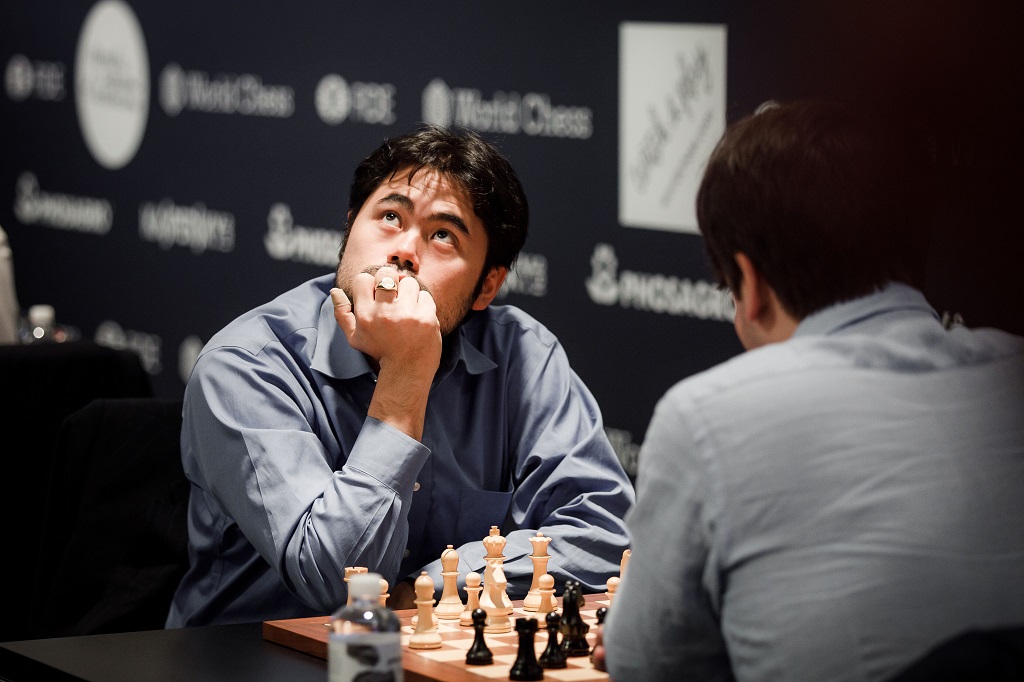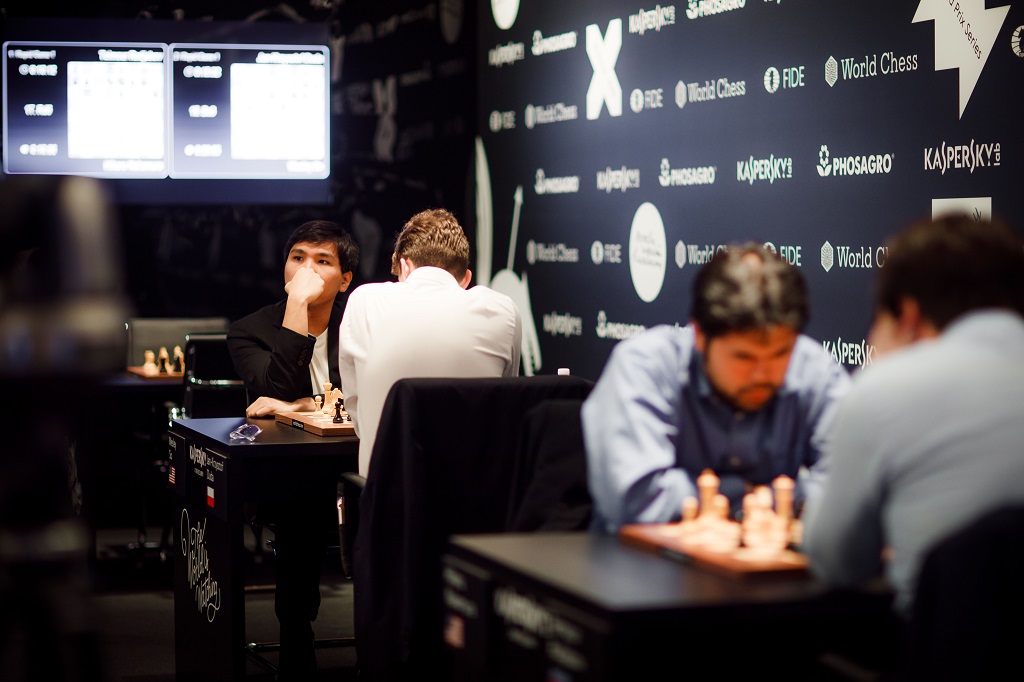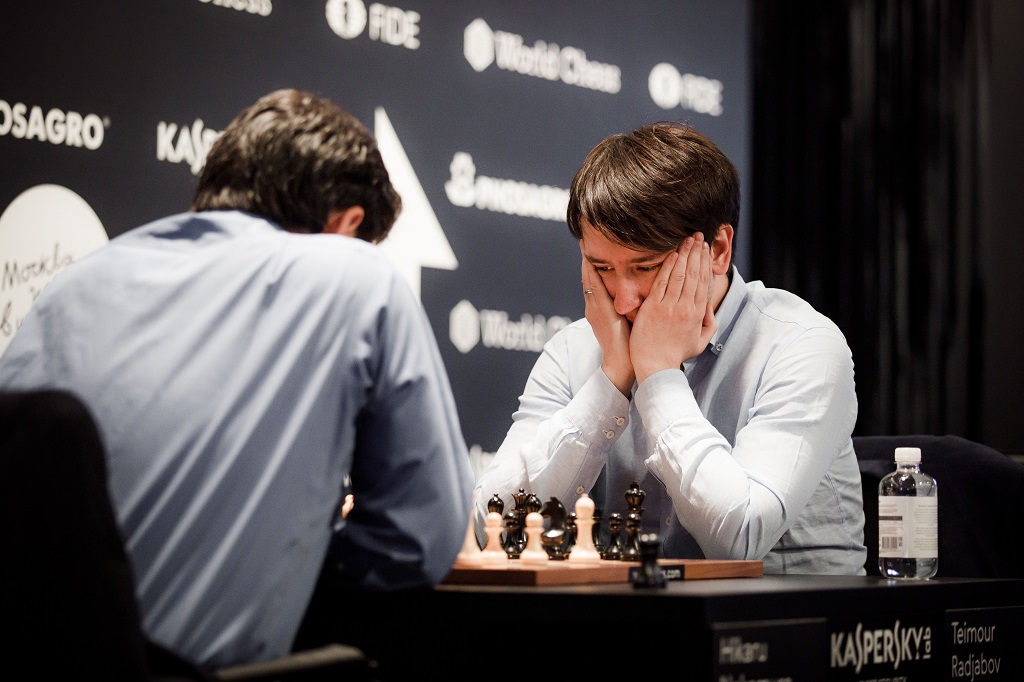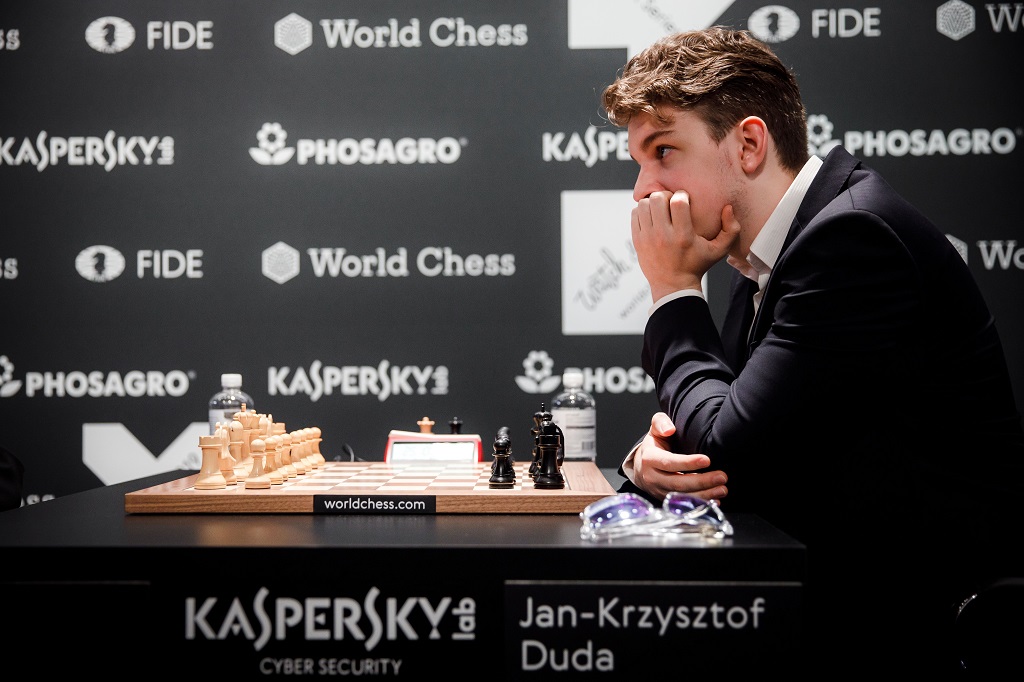


ChessBase 17 - Mega package - Edition 2024
It is the program of choice for anyone who loves the game and wants to know more about it. Start your personal success story with ChessBase and enjoy the game even more.
The tie-breaks of round one concluded at the Central Chess Players' House in Moscow and the quarter-finals pairings are now determined. Curiously, none of the Russian players that survived round one were paired against each other. Furthermore, the pairings remind us of the Soviet Union (or Russia) vs. Rest of the World matches that took place in 1970, 1984 and 2002. Much like in the first edition of said matches, the Grand Prix quarter-finals include two representatives from the United States — in 1974, Bobby Fischer and Samuel Reshevsky were part of the "World" team. Coincidentally, in 2002, both Alexander Grischuk and Peter Svider played for Russia in the match that also took place in Moscow.
It's Russia against the World in Moscow #GrandPrixFIDE Quarterfinals that start May 20! Which 'team' do you think will win?
— International Chess Federation (@FIDE_chess) 19 de mayo de 2019
🇷🇺 Daniil Dubov vs Hikaru Nakamura 🇺🇸
🇷🇺 Alexander Grischuk vs. Wesley So 🇺🇸
🇷🇺 Ian Nepomniachtchi vs. Wei Yi 🇨🇳
🇷🇺 Peter Svidler vs. Radoslaw Wojtaszek 🇵🇱 pic.twitter.com/vI2lKaaELs
FIDE's tweet presents the pairings in order, so the winner of Dubov v Nakamura will face the winner of Grischuk v So, while Nepomniachtchi v Wei Yi and Svidler v Wojtaszek are on the 'bottom' side of the draw.

Only two boards on Sunday | Photo: World Chess
The players that used the safest strategy during the classical games continued playing solid moves on Sunday. It is tempting to say, in hindsight, that Nakamura knew what he was doing all along, given his strength in rapid play, but we have seen this strategy backfire in the past — albeit Magnus' triumph in last year's World Championship match, after drawing all twelve classical games.
Hikaru had White first, and was patiently manoeuvring his pieces while looking for ways to make the most of his spacial advantage in the centre. Radjabov was keeping the balance effectively, but later regretted his decision to weaken his king's position on move 32:
Power Play 23: A Repertoire for black with the Queen's Gambit Declined
On this DVD Grandmaster Daniel King offers you a repertoire for Black with the QGD. The repertoire is demonstrated in 10 stem games, covering all White's major systems: 5 Bg5, 5 Bf4, and the Exchange Variation.
Teimour played 32...f6, and Hikaru immediately routed his knight to the weakened g6-square with 33.♘h4. Black's position did not take long to collapse:
The Azeri is forced to capture the knight with 36...Nxg6, but after 37.hxg6 Black has only three spite checks before allowing White to infiltrate his king's position.

Radjabov was not in the mood to create big imbalances | Photo: World Chess
In the return game, Radjabov played it cool with the white pieces, rejecting the idea of playing any sort of risky opening. Nakamura managed to exchange a couple of pieces and keep the pawn structures symmetrical. According to both contenders, Teimour's biggest chance to create an imbalance came on move 22:
Master Class Vol.4: José Raúl Capablanca
He was a child prodigy and he is surrounded by legends. In his best times he was considered to be unbeatable and by many he was reckoned to be the greatest chess talent of all time: Jose Raul Capablanca, born 1888 in Havana.
Instead of 22.♖ad1, Radjabov could have opted for 22.♗f4, which would have likely been followed by 22...♜cc8 23.♕d7 ♛a6 24.♕xf7 and White would be a pawn up, although it is not very clear that the advantage will amount to much. Nonetheless, in the game, Hikaru kept things under control until signing the draw after 30 moves.
So, Naka will face Dubov in the next round. When asked about his pairing, the current US champion responded:
I'm just looking forward to playing him. I thought that he obviously played very well against Anish, but I thought Anish — for being such a strong player — did not have a lot of confidence in that match. He basically said he was the underdog the whole way through, which I thought...I mean, okay, Daniil obviously won the Rapid [World Championship], but just to assume that you're gonna lose, I think puts you in a very bad mood for the rest of the match...

A VIP shuttle gets the players to the playing hall | Photo: World Chess
After losing on tie-breaks, Jan-Krzysztof Duda might be regretting his decision to play the Sicilian Dragon in game two of the classical portion. In the first game of the Rapid, So played the Italian and a slow manoeuvring struggle ensued. When the smoke finally cleared So was a pawn up, but the commentary team — and the computers — assessed the position as equal. Until, all of a sudden, the Polish grandmaster blundered horribly:
My Black Secrets in the Modern Italian
The Italian Game is considered a sound but quiet opening without early trades, giving rise to rich positions where plans are more important than forced variations. So shows black's plans on this DVD.
Black's d4-bishop is under attack and White's e4-bishop is pinned — it is true that Duda needed to be careful not to hang any piece, but playing 35...♝xf2 was not the solution (35...♝b6 or 35...♝a7 are good enough to keep the fight going). In the game, White has 36.♗xc6 and after 36...♜xe2 37.♗xb5 Black's rook is doomed — it cannot defend the knight from d2 or c2, as the bishop can go to d3 in the following move.
Duda gave up the bishop with 37...♜e3 38.♔xf2 and White has a decisive advantage. Jan-Krzysztof resigned after 44 moves.

Duda won the first classical game, but was eliminated nonetheless | Photo: World Chess
Game two of the rapid saw Duda playing the Italian once again. The 21-year-old from Krakow played actively and got the initiative in the middlegame. He converted his positional edge into an endgame with two pawns for a bishop, with a much safer king to boot. On move 42, however, he could not find a tricky manoeuvre Black had at his disposal:
Attacking with the Italian Game and the Ruy Lopez
The purpose of this DVD is to teach players how to conduct the attack on the black king using different methods. Although the Italian Game and the Ruy Lopez are mostly positional openings, it is very often possible to make use of attacking methods of play
Instead of 42.♖g3, Duda could have opted for 42.♖g6, as after taking the rook to g6 Black's 42...♞c1 would not threaten to fork the king and the rook on g3. In the game, White followed 43.♖xc6 and Black gained an exchange with 43...♞e2+ 44.♔h2 ♞xg3 45.♔xg3. After 45...h4 46.♔xh4 ♜xf2 Black's rooks are active and can create enough counterplay to keep the balance.
In the final position, White cannot make use of his connected passers on the kingside:
Black's rook and king can easily keep things under control.

So thanked his adoptive mom Lotis Key after his win | Photo: World Chess
Commentary by GMs Evgeny Miroshnichenko and Daniil Yuffa